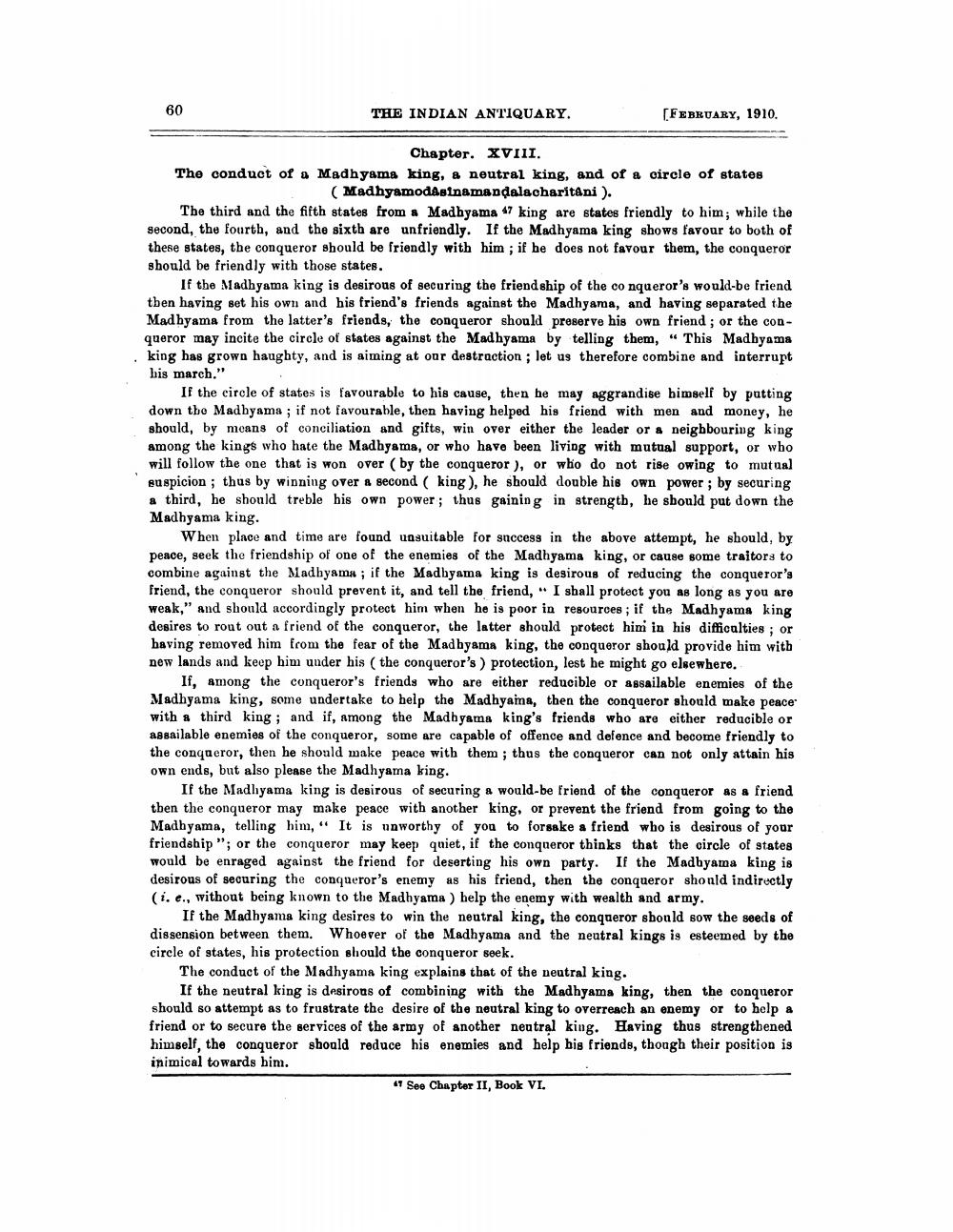________________
THE INDIAN ANTIQUARY.
[FEBRUARY, 1910.
Chapter. XVIII. The conduct of a Madhyama king, a neutral king, and of a circle of states
(MadhyamodAsinamapdalacharitani ). The third and the fifth states from a Madhyama 47 king are states friendly to him; while the second, the fourth, and the sixth are unfriendly. If the Madhyama king shows favour to both of these states, the conqueror should be friendly with him ; if he does not favour them, the conqueror should be friendly with those states.
If the Madhyama king is desirous of securing the friendship of the conqueror's would-be friend tben having set his own and his friend's friends against the Madhyama, and having separated the Madhyama from the latter's friends, the conqueror should preserve his own friend; or the conqueror may incite the circle of states against the Madhyama by telling them, “This Madhyama king has grown haughty, and is aiming at our destraction ; let us therefore combine and interrupt his march."
If the circle of states is favourable to his cause, then he may aggrandise himself by putting down the Madhyama; if not favourable, then having helped his friend with men and money, he should, by means of conciliation and gifts, win over either the leader or a neighbouring king among the kings who hate the Madhyama, or who have been living with mutual support, or who will follow the one that is won over (by the conqueror ), or who do not rise owing to mutual euspicion ; thus by winning over a second (king), he should double his own power; by securing a third, he should treble his own power; thus gaining in strength, he should put down the Madhyama king.
When place and time are found unsuitable for success in the above attempt, he should, by peace, seek the friendship of one of the enemies of the Madhyama king, or cause some traitors to combine against the Madhyama; if the Madhyama king is desirous of reducing the conqueror's friend, the conqueror should prevent it, and tell the friend, " I shall protect you as long as you are weak," and should accordingly protect him when he is poor in resources; if the Madhyama king desires to rout out a friend of the conqueror, the latter should protect him in his difficulties ; or having removed him from the fear of the Madhyama king, the conqueror should provide him with new lands and keep him under his (the conqueror's ) protection, lest he might go elsewhere.
If, among the conqueror's friends who are either reducible or assailable enemies of the Madhyama king, some undertake to help the Madhyama, then the conqueror should make peace with a third king; and if, among the Madhyama king's friends who are either reducible or assailable enemies of the conqueror, some are capable of offence and defence and become friendly to the conqueror, then he should make peace with them ; thus the conqueror can not only attain his own ends, but also please the Madhyama king.
If the Madhyama king is desirous of securing a would-be friend of the conqueror as a friend then the conqueror may make peace with another king, or prevent the friend from going to the Madhyama, telling him, " It is unworthy of you to forsake a friend who is desirous of your friendship"; or the conqueror may keep quiet, if the conqueror thinks that the circle of states would be enraged against the friend for deserting his own party. If the Madhyama king is desirous of securing the conqueror's enemy as his friend, then the conqueror should indirectly (i. e., without being known to the Madhyama ) help the enemy with wealth and army.
If the Madhyama king desires to win the neutral king, the conqueror should sow the seeds of dissension between them. Whoever of the Madhyama and the neutral kings is esteemed by the circle of states, his protection should the conqueror soek.
The conduct of the Madhyama king explains that of the neutral king.
If the neutral king is desirous of combining with the Madhyama king, then the conqueror should so attempt as to frustrate the desire of the neutral king to overreach an enemy or to help a friend or to secure the services of the army of another neutral king. Having thus strengthened himself, the conqueror should reduce his enemies and help bis friends, though their position is inimical towards him.
47 See Chapter II, Book VI.




